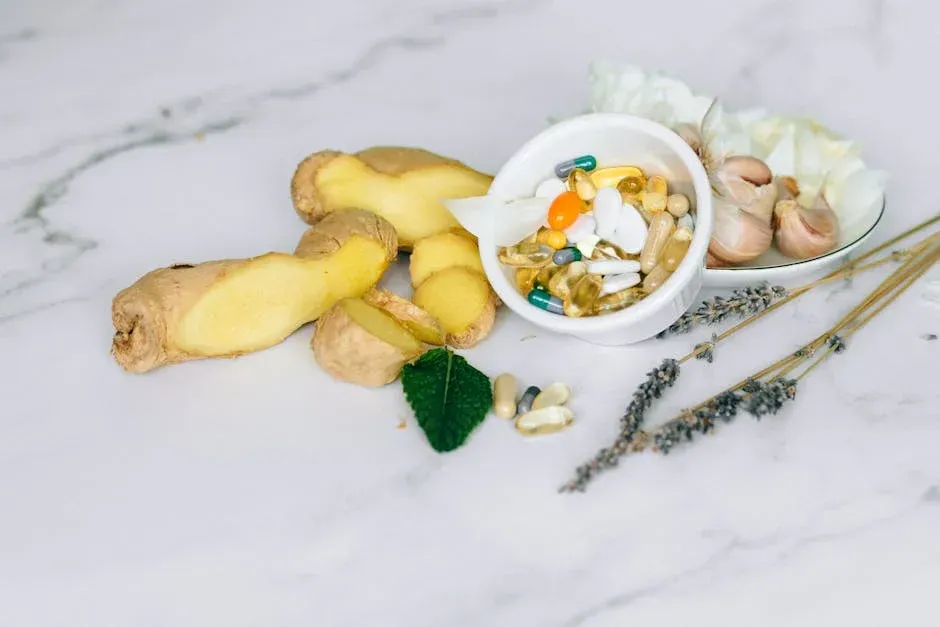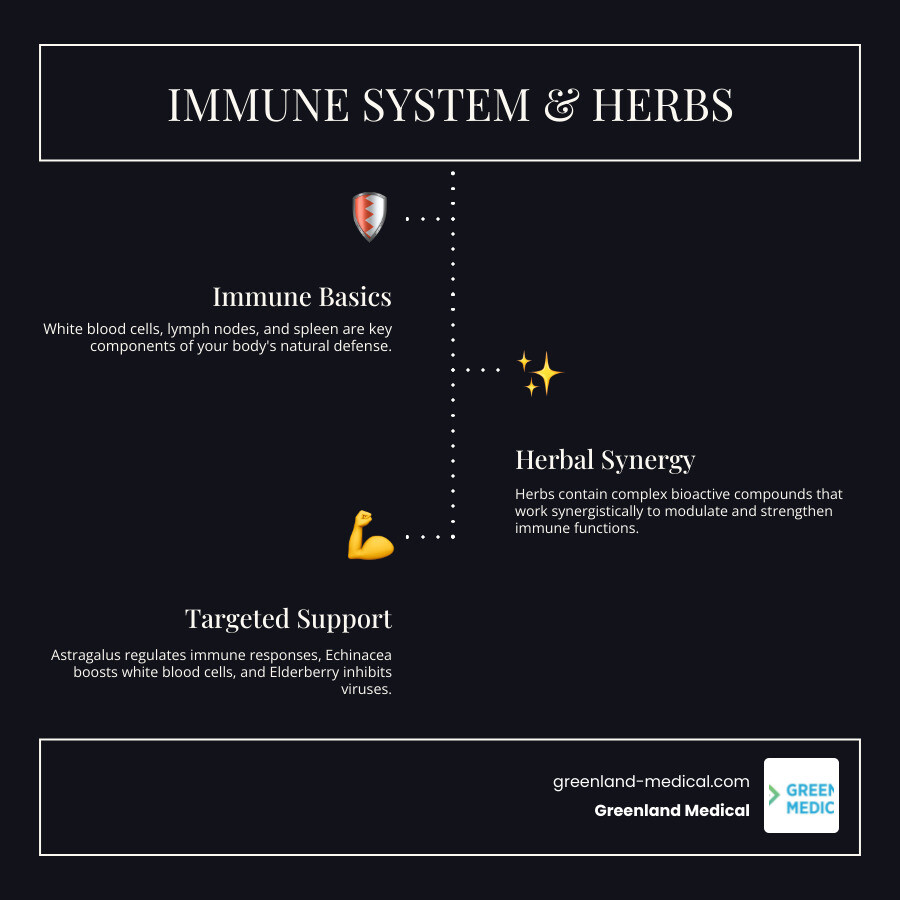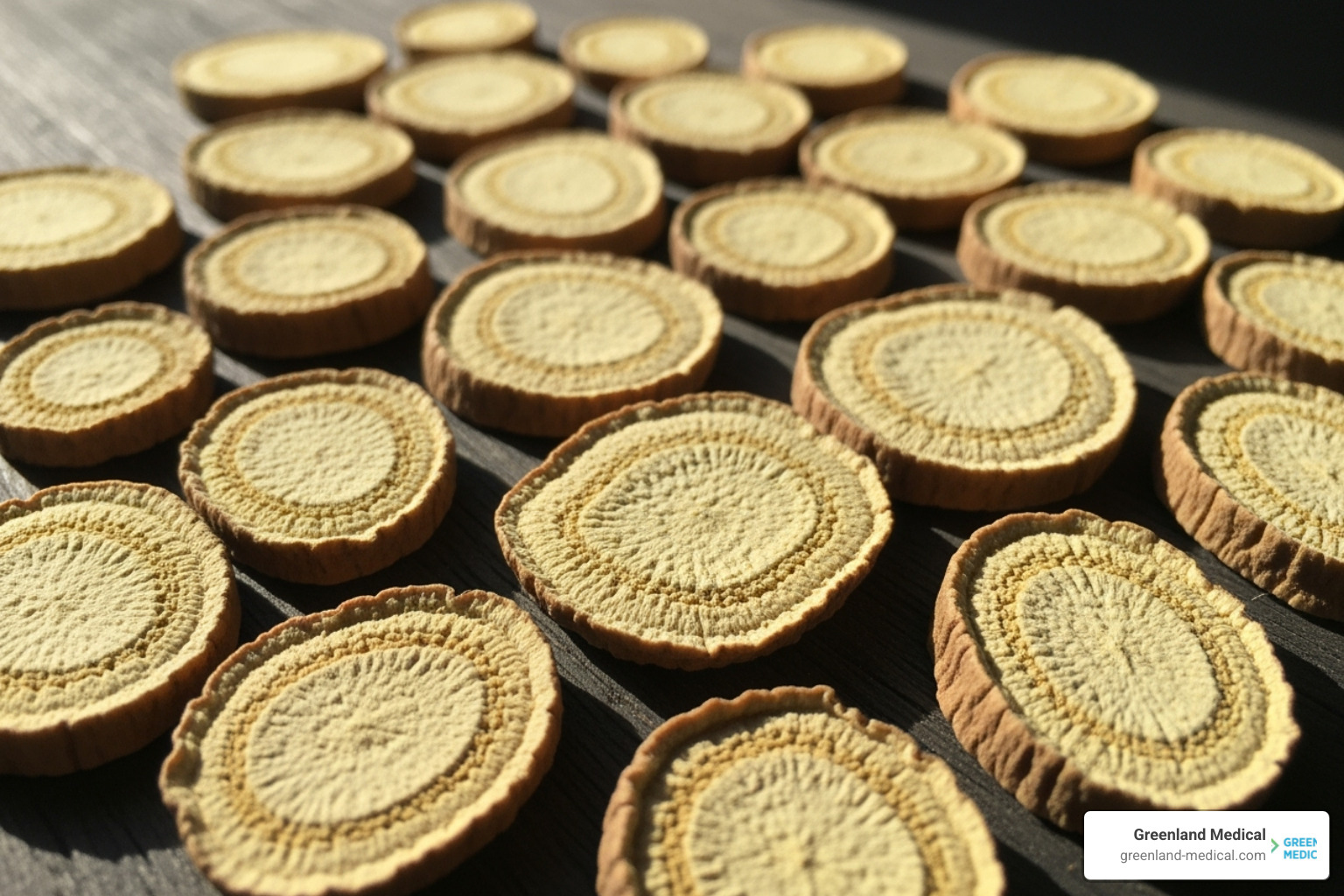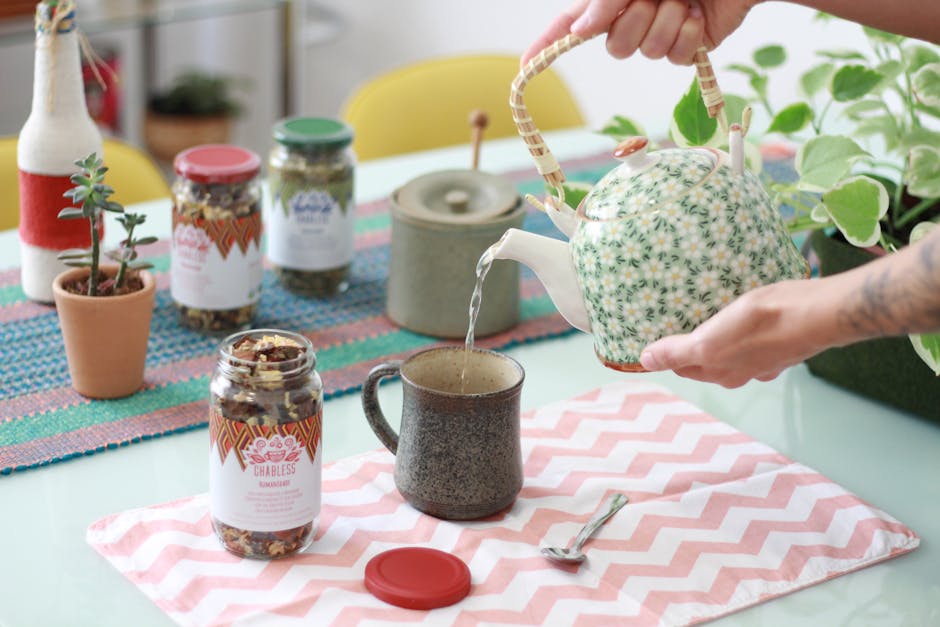
Nature's Defenders: Top Herbs for Immune System Wellness
Why Your Immune System Needs Nature's Help
For millennia, herbs for immune support have been a primary defense against illness. Before modern medicine, our ancestors relied on plants like echinacea, ginger, and elderberry to strengthen their bodies against infections.
Top herbs for immune support include:
Astragalus - adaptogenic root that regulates immune responses
Ginger - anti-inflammatory powerhouse that soothes and protects
Turmeric - golden spice with potent immune-modulating compounds
Echinacea - classic cold fighter that boosts white blood cells
Elderberry - viral inhibitor rich in protective antioxidants
Garlic - antimicrobial bulb that improves immune cell function
Cinnamon - warming spice with antimicrobial properties
Angelica root - respiratory soother used in traditional medicine
Modern life presents unique challenges to our immune systems, from chronic stress and processed foods to environmental toxins. Research shows that "substantial evidence suggests that consumption of a healthful diet, inclusive of herbs and spices, may strengthen the body's immune system against diseases including highly contagious viruses."
Herbal medicine offers a gentle yet effective approach. Unlike synthetic drugs that target single pathways, herbs contain complex arrays of bioactive compounds that work synergistically to support multiple aspects of immune function. They help restore balance to your body's defenses, not just mask symptoms.
I'm Dr Andrew Greenland, an integrative functional medicine practitioner. In my practice at Greenland Medical, I've seen how herbs for immune support can complement conventional treatments to help patients achieve lasting wellness and vitality.

Top 8 Herbs for Immune Support
Nature has been our pharmacy for thousands of years. These eight herbs for immune support are some of the most powerful allies your immune system can have, each with unique compounds to strengthen your body's natural defenses.
Astragalus Root (Huang Qi): The Adaptogen Shield

In Traditional Chinese Medicine, astragalus (Huang Qi) is a revered adaptogen used for over 2,000 years. Its special compounds, polysaccharides and saponins, help the body adapt to stress and resist infection. It essentially trains the immune system to respond more effectively without overreacting.
Scientific research on Astragalus' immune effects and animal studies on immune regulation show how this root helps create immune balance. While not a cure for specific viruses, astragalus excels at building overall immune resilience, which is exactly what you want from a foundational herb.
Ginger (Zingiber officinale): The Anti-Inflammatory Powerhouse
More than a kitchen spice, this spicy rhizome is one of nature's most potent anti-inflammatory medicines. Its bioactive compounds, gingerol and shogaol, are responsible for its ability to reduce inflammation. Since chronic inflammation can suppress immunity, ginger's action is crucial for strong defenses.
Beyond this, ginger soothes sore throats and aids digestion. With about 70% of the immune system housed in the gut, ginger's digestive benefits also support immunity. Its antioxidant properties protect cells from damage, as detailed in this review of ginger's health effects.
Turmeric (Curcuma longa): The Golden Spice of Immunity
Known as the "golden spice of immunity," turmeric has been treasured in Ayurvedic and Chinese medicine for over 4,000 years. Its primary active compound, curcumin, is a potent anti-inflammatory and antioxidant that modulates immune cells, helping to control inflammation that can exhaust the immune system.
Crucially, curcumin has poor bioavailability on its own. Pairing it with piperine from black pepper can increase absorption by up to 2,000%. This is why traditional recipes often include both. Research on curcumin and cytokine concentrations shows how it influences the body's immune mediators for optimal function.
Echinacea (Echinacea purpurea): The Cold Fighter
Echinacea is perhaps the most well-known herb for immune support, earning its reputation as a cold fighter through traditional use and modern research. Its bioactive compounds, including alkylamides and polysaccharides, stimulate the immune system by increasing white blood cell production and activity.
Echinacea has antiviral properties and can reduce the duration and severity of common cold and flu symptoms. The roots are typically used for acute support, while the leaves and flowers offer gentler, ongoing maintenance.
Elderberry (Sambucus nigra): The Viral Inhibitor
A staple for cold and flu season, this small, dark purple berry offers impressive support against viral challenges. Its deep purple color signifies a high concentration of anthocyanins and flavonoids, potent antioxidants that fight inflammation and oxidative stress.
Research suggests elderberry compounds can block viral entry into cells and inhibit viral replication, making it effective against influenza A and B. A key safety note: only use properly prepared elderberry products, as raw or unripe parts can be toxic. Stick to trusted commercial or cooked preparations.
Garlic (Allium sativum): The Pungent Protector
More than a flavoring, garlic is a well-researched herb for immune support used for millennia. Crushing or chopping fresh garlic activates allicin, a sulfur compound responsible for its smell and many of its antimicrobial, antiviral, and antifungal properties.
Garlic works by enhancing immune cell function, boosting cells like natural killer cells and macrophages. For maximum benefit, let crushed or chopped garlic sit for 10-15 minutes before cooking to fully develop the allicin. Raw garlic provides the most potent immune support.
Cinnamon (Cinnamomum verum): The Warming Defender
This warming spice is packed with antioxidants and has impressive anti-inflammatory and antimicrobial properties, making it a valuable immune-support tool. Its primary bioactive compound, cinnamaldehyde, provides its distinctive flavor and helps combat various pathogens.
When shopping, you'll find Ceylon (true) cinnamon and Cassia cinnamon. Ceylon is generally preferred for regular medicinal use because Cassia contains higher levels of coumarin, which can be problematic in large doses. Cinnamon's immunomodulatory effect shows how it can influence immune responses.
Angelica Root (Angelica archangelica): The Respiratory Soother
Though less familiar, angelica root has supported respiratory health in traditional European and Chinese medicine for centuries. Native to northern regions, this herb contains beneficial coumarins and is known for its ability to modulate the immune system for balanced responses.
Angelica root excels at supporting respiratory health, soothing discomfort and helping to clear congestion, making it valuable during seasonal challenges. This research on Angelica's use in treating respiratory ailments explores its traditional applications.
How to Incorporate Immune-Boosting Herbs into Your Daily Routine
The magic of herbs for immune support lies in making them a natural part of your everyday life. Your body responds best to gentle, regular support, not sporadic intense doses. These powerful plants fit easily into existing routines, whether through teas, cooking, or supplements.
Brewing Potent Herbal Teas for immune support

Brewing herbal tea is a satisfying, ancient art that turns plants into liquid medicine. Different parts of herbs require different brewing methods to extract their benefits.
Delicate leaves and flowers like peppermint are best prepared as an infusion. Simply pour hot water over them and let them steep for 5-15 minutes. This releases compounds for a soothing brew that supports digestion and respiratory comfort.
Tougher roots and barks like astragalus, ginger, and angelica root require a decoction. Simmer these hardy parts in water for 20-45 minutes to extract their deep, immune-supporting compounds.
Two of my favorite immune-supporting tea recipes are simple and effective. The ginger-lemon-honey combination is pure comfort. Simmer sliced fresh ginger for 10-15 minutes, strain, and add fresh lemon juice and raw honey. This warming blend soothes sore throats and boosts circulation.
For an earthy, anti-inflammatory powerhouse, try a turmeric-cinnamon tea. Combine half a teaspoon of ground turmeric, a pinch of black pepper (essential for curcumin absorption), and a cinnamon stick or half a teaspoon of ground cinnamon. Steep in hot water for 5-10 minutes.
Using Tinctures and Supplements Effectively
When life is busy or you need a more concentrated dose, tinctures and supplements are excellent allies. Tinctures are potent liquid extracts that preserve active compounds in a concentrated, easy-to-use form.
They offer concentrated potency and consistent dosing, making them ideal for travel, busy mornings, or at the first sign of illness. Proper dosage is crucial; always follow label directions or a practitioner's guidance, as more isn't always better.
Bioavailability is key with supplements. For example, curcumin from turmeric is poorly absorbed unless paired with piperine from black pepper or formulated for better delivery.
Quality is paramount. Choose manufacturers who are transparent about sourcing, testing, and production. Look for certifications like Certified Organic, adherence to cGMP standards, and third-party testing to ensure you're getting pure, potent products.
Cooking with Herbs and Spices for daily immune support
Perhaps the most enjoyable way to use herbs for immune support is in the kitchen. Your spice rack can transform ordinary meals into medicine.
Garlic and onion are a great foundation. Their sulfur compounds, released when chopped, have powerful antimicrobial benefits. Use them as a base for soups, stews, and sauces.
Fresh turmeric and ginger add warmth and healing to broths, soups, and curries. Their anti-inflammatory properties and flavor make healthy eating a pleasure. Remember to add black pepper with turmeric to boost curcumin's potential.
Cinnamon adds sweetness without sugar and delivers antioxidants to oatmeal, yogurt, or smoothies. It also helps support healthy blood sugar levels, a double win for your health.
Create synergistic food combinations to amplify benefits, like a chicken soup enriched with garlic, ginger, and turmeric. These flavorful additions also help reduce reliance on less healthy ingredients like excess sodium and sugar.
Safety, Precautions, and a Note on Viral Illnesses
While herbs for immune support offer incredible benefits, they must be approached with wisdom and respect. At Greenland Medical, safety always comes first.
Important Precautions and Potential Side Effects
Herbs contain potent compounds that interact with the body. This is why they work, and why we must use them thoughtfully.
Consulting with a healthcare provider is essential before starting any herbal regimen, especially if you have health conditions or take medications. Assuming "natural" means "safe" can lead to complications.
Pregnancy and breastfeeding require extra caution. Many herbs haven't been studied for safety during these times.
Children need special consideration and different dosages. Never assume an adult dose can be halved for a child.
With autoimmune diseases like rheumatoid arthritis or lupus, immune-stimulating herbs can be counterproductive. Working with a knowledgeable practitioner is crucial.
Drug interactions are common. Herbs can interfere with medications like blood thinners or immunosuppressants.
The FDA's generally recognized as safe (GRAS) status for spices in food doesn't automatically apply to medicinal doses in supplements.
Specific warnings include the potential toxicity of raw elderberry parts and liver issues linked to very high doses of green tea extracts on an empty stomach. This is to encourage wise, not fearful, use of herbs.
Herbs and Viral Infections: What the Science Says
During viral outbreaks, interest in herbs for immune support spikes. It's important to be honest about what we know.
Herbs work best as supportive care. They gently boost your body's defenses and help you feel better during recovery, but they are not cures for specific viral infections. Research on the general antiviral properties of herbs is exciting, but what works in a lab doesn't always translate to treating human infections.
For specific viruses like SARS-CoV-2, no herb has been proven to prevent or cure COVID-19. Claims otherwise are irresponsible. Following public health guidelines remains our best defense.
Traditional Chinese Medicine has been used alongside conventional treatments for COVID-19 in China, as documented in research on TCM use, but this was within a comprehensive healthcare system, not as a standalone treatment.
Think of herbs as part of a complete wellness strategy, combined with public health measures, good nutrition, adequate sleep, and proper medical care when needed. The goal is to use the best of both natural and conventional medicine to keep you healthy.
Frequently Asked Questions about Herbs for Immune Support
At Greenland Medical, we often get thoughtful questions about herbs for immune support. Here are the most common ones and our honest answers.
Can I replace my medications or vaccines with herbs?
A common question is whether herbs can replace medications or vaccines. The answer is a clear no. Herbs should never replace prescribed medical treatments.
Our integrative medicine approach combines modern science with proven natural therapies. Herbs are a support team, not a replacement for primary treatments. They support your natural defenses while medications provide targeted action, often helping conventional treatments work better. Always work with your healthcare team to combine approaches safely.
How long does it take for immune-boosting herbs to work?
The time it takes for herbs for immune support to work varies. Some offer quick relief, while others build strength over time.
Some herbs offer immediate comfort. Ginger tea can soothe a sore throat in minutes, and elderberry may shorten a cold's duration. These are acute effects. Other herbs act as tonics, strengthening you gradually. Astragalus, for example, builds resilience over weeks or months of consistent use, helping you get sick less often.
Consistency is key. Herbs aren't quick fixes. Their strength lies in working with your body's natural processes for lasting improvement rather than just masking symptoms.
What's the difference between using fresh herbs and dried supplements?
Both fresh herbs and supplements have their place, and understanding their different purposes helps you get the most benefit.
Fresh herbs are great for daily meals. They provide a broad spectrum of compounds, including vitamins and minerals, that work together naturally. The downside is that the concentration of active compounds varies, which is fine for daily wellness but less precise for targeted support.
Supplements offer precision and concentration for targeted support, providing standardized amounts of bioactive compounds at levels hard to get from food alone. However, processing can alter some delicate compounds.
This is why a combined approach is often best: fresh herbs for daily nourishment and supplements for focused support when you need it most.
Conclusion: A Natural Approach to a Resilient Immune System
As we've explored herbs for immune support, it's clear nature provides a time-tested path to stronger immunity, from Astragalus and Turmeric to Elderberry and Garlic. Their power lies in their complex bioactive compounds, which work together to reduce inflammation, provide antioxidant protection, and help the immune system respond more effectively.
We've shown practical ways to incorporate these herbs into your daily routine, from teas to cooking. These small, consistent steps can make a meaningful difference in your resilience.
But lasting wellness requires a holistic approach. Herbs for immune support are most effective as part of a bigger picture. True immune resilience comes from weaving together multiple threads of health: a nutrient-rich diet, quality sleep, stress management, and regular movement.
This holistic approach is at the heart of what we do at Greenland Medical. We focus on finding and fixing root causes of illness by combining the wisdom of natural therapies with modern functional medicine, including specialized protocols like the Bredesen approach, to create personalized care.
By supporting your immune system with nature's gifts and healthy lifestyle choices, you're not just preventing illness—you're investing in vibrant, proactive health for the future.
Ready to take the next step in your wellness journey? We'd love to support you with our integrative approach. Learn more about our Naturopathic Medicine services and find how we can help you build the resilient health you deserve.
